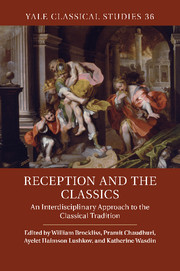Book contents
- Frontmatter
- Contents
- Notes on contributors
- Acknowledgements
- Chapter 1 Introduction
- Part I Reception between Transmission and Philology
- Chapter 2 “Arouse the dead”: Mai, Leopardi, and Cicero's commonwealth in Restoration Italy
- Chapter 3 Honor culture, praise, and Servius’ Aeneid
- Chapter 4 Joyce and modernist Latinity
- Chapter 5 Lyricus vates: musical settings of Horace's Odes
- Part II Reception as Self-Fashioning
- Part III Envoi
- Bibliography
- Index
Chapter 4 - Joyce and modernist Latinity
from Part I - Reception between Transmission and Philology
Published online by Cambridge University Press: 05 December 2011
- Frontmatter
- Contents
- Notes on contributors
- Acknowledgements
- Chapter 1 Introduction
- Part I Reception between Transmission and Philology
- Chapter 2 “Arouse the dead”: Mai, Leopardi, and Cicero's commonwealth in Restoration Italy
- Chapter 3 Honor culture, praise, and Servius’ Aeneid
- Chapter 4 Joyce and modernist Latinity
- Chapter 5 Lyricus vates: musical settings of Horace's Odes
- Part II Reception as Self-Fashioning
- Part III Envoi
- Bibliography
- Index
Summary
For at least the past couple of hundred years, ancient Greece – by which I mean Greek literature, Greek studies, Greek philosophy, and especially the Greek language – has generally held a position of greater prestige in Western culture than has any of the Latin or Roman counterparts. This may be truer in some national cultures than in others. Whether it is generally the case in those nations where romance languages are spoken I would not say. In Germany it seems certainly to have been true for a long time, but that is not the subject of this paper. My concern is with the Anglophone world, which is itself not monolithic; but in respect of attitudes towards Greece and Rome, the prevailing trends have long been similar in British and American culture and in colonial cultures as well. This situation is sometimes explained as a product of the Romantic movement at the turn of the eighteenth and nineteenth centuries, and cultural historians have amply documented the Romantic fascination with things Greek. During much of the time since, even if the Romans have had their advocates, many have expressed the opinion or have simply assumed that Greek literature, Greek art, and even the Greek language, are simply more beautiful, in an intrinsic sense, than their Latin and Roman counterparts.
The focus of this paper is the work of James Joyce, and its purpose is to raise the possibility that Joyce is at least a partial and paradoxical exception to this rule. The paradox arises from the fact that Joyce is a consummately Modernist writer who is in many respects representative of Modernist aesthetics and values; but in respect to his creativity in using Latin, I believe, he is something of an exception.
- Type
- Chapter
- Information
- Reception and the ClassicsAn Interdisciplinary Approach to the Classical Tradition, pp. 57 - 71Publisher: Cambridge University PressPrint publication year: 2011

